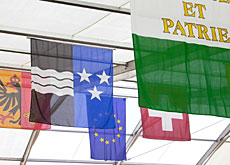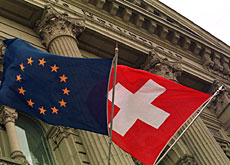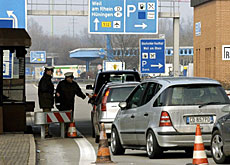Cantons call for new debate on EU membership

Almost half of Switzerland’s 26 cantons are in favour of the country joining the European Union.
At the cantonal governments’ conference they demanded a clearer European policy and warned that the bilateral agreements with the EU would lead nowhere.
“The cantons don’t see an alternative to EU membership,” said Hans Martin Tschudi, a parliamentarian from Basel.
During their regular meeting 12 cantons expressed support for EU membership, eight were opposed to it and five abstained.
“This is a clear sign that there shouldn’t be any more bilateral agreements with the EU,” said Christian Democrat parliamentarian Georg Hess.
Making progress
Most cantons believe that it is important for Switzerland to join the club if it wants to remain competitive.
“Switzerland can no longer go it alone, as it is already too much integrated into European policies,” said Tschudi.
The cantons further agreed on the need for headway in Swiss-EU relations, and called on the federal government to examine more fully the option of joining the union.
“The Swiss federal government should look at the pros and cons of EU membership, and sort out details. What would a hike in VAT mean for our tax system, for example,” Tschudi said.
“A European policy which does not look after the people’s interest is bound to fail.”
Bilaterals
The first set of bilateral accords – seen as an alternative to EU membership – came into force on June 1, 2002.
Talks are currently underway on a second set of ten bilateral agreements between Switzerland and the EU.
These include Switzerland becoming a member of the Schengen-Dublin accords – the EU’s common policy on cross-border crime and asylum – taxation of savings, prevention of fraud, and education and professional training.
However, Bern wants amendments to the Schengen accord governing cross-border crime, which – as it stands – could threaten banking secrecy. The Swiss want an opt-out in the area of judicial cooperation.
Border checks
Earlier this month the dispute between the EU and Switzerland seemed to have come to a head when the Germans imposed stringent border checks, which caused huge tailbacks on the Swiss side of the frontier.
But the German government has repeatedly denied allegations that the measures were a tit-for-tat response to Switzerland’s reluctance to sign a treaty aimed at curbing tax evasion.
During a visit to Switzerland earlier this week, German foreign minister Joschka Fischer once again defended Germany’s stricter border controls.
“Switzerland is outside the EU and every person has to be checked according to the Schengen agreement, which was signed in 1995,” Fischer told his Swiss counterpart, Micheline Calmy-Rey.
swissinfo with agencies
The first set of seven bilateral agreements governing labour, trade and transport agreements came into force in June 2002.
Switzerland is negotiating a second round of ten bilateral agreements including taxation of savings, prevention of fraud and education and professional training.
Schengen would lead to the scrapping of border controls between Switzerland and the EU.
It would provide common policies for fighting crime and a joint system of investigation and information.

In compliance with the JTI standards
More: SWI swissinfo.ch certified by the Journalism Trust Initiative













You can find an overview of ongoing debates with our journalists here . Please join us!
If you want to start a conversation about a topic raised in this article or want to report factual errors, email us at english@swissinfo.ch.